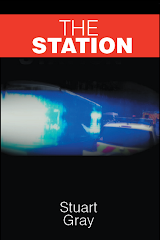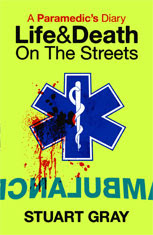Another wet day. Five emergency calls, one purple plus, one conveyed, one time-waster and the others required an ambulance.
My first call was to a 55 year-old female with 'no heart beat', given as suspended by Control. There was already a crew on scene but they always send a few of us to a job like this. There is little doubt that it will be as given when the combination of caller description and CAD scripts match up - no ambiguity.
I arrived and pressed the entry button for the flats. A few seconds later I was buzzed in by a crying female. I entered the lift and when I got out I could hear her wailing from all the way down the corridor. All of the neighbours must have been aware of her crisis too.
I was let into the flat by one of the crew who guided me upstairs. The paramedic was downstairs with the crying woman, so I knew that nothing was being done for the patient. When I got to the bedroom, I saw that the lady lying on the floor had been dead for some time, probably since the night before - nothing could be done.
I went downstairs and joined the crew who were consoling the young woman. This was the daughter of the deceased and she was completely beside herself with grief. She kept saying, over and over again, that her mother must have been crying out for her in the night but that she hadn't heard and had slept right through her death. She had gone to wake her mum up this morning and had found her - stiff, discoloured and with her mouth and eyes wide open. This had given her the impression that her mother must have been crying out as she died. This isn't necessarily true. The last few breaths taken by a dying person are usually taken after consciousness has slipped away - they are the body's desperate responses to a drop in oxygen levels and are nervous reflexes. If the last muscular reflex leaves the mouth open, then it will seem as if the person has screamed.
I felt devastated for the girl, her mother was only 51 years-old, so she couldn't have been that old herself; she looked to me to be in her late twenties or early thirties.
I arranged for the police to attend (the daughter was too upset to remember the GP's details)and left the scene when they turned up a few minutes later. It was a sad way to start the shift.
I wasn't required for the next job. It was for a female with DIB and the crew arrived just as I did, so I bowed out - no point in having a whole gang of us descend on the patient.
I went back to the station and spent a few hours there, watching telly, making coffee...receiving and cancelling calls (thanks Fred). Then an opportunity to do some real work was wrenched away from me as I set off on it. It was a 'one-under'. This is the term used for someone who jumps, falls or is pushed in front of a train - usually on the underground. These incidents are much more common than you'd think and the first one I ever did ended up as a feature on the TV programme Trauma - the patient in that instance survived until we got him to the platform, where he died of his injuries but not without a long and dedicated attempt to keep him going - all in front of a TV crew.
Anyway, I never got to deal with this one because I was cancelled and sent to deal with an 18 year-old 'collapsed' around the corner instead.
In theory it should have taken me two minutes to get there but, largely as a result of the many roads that have been closed off around the station, I spent at least ten minutes meandering my way around until I found an access route that was open - I should point out (as I have before)that we have no up to date road closure bulletins to help us. It's all down to guess work and potentially highway code-breaking self-navigation.
The ambulance crew were already on scene, of course and they had come from further away. I couldn't find them at first but they wandered over to the car, patient-less and explained that the '18 year-old, collapsed in street' was in fact a drunken man who had decided to hurl abuse at them. They left him where he was but he followed a few yards behind and asked for directions to the nearest train station. He was given directions but he clearly hadn't received them in his brain, so he asked again...and again...and again. Eventually he wobbled off in the right general direction and we all left the scene before he fell down and we were required for real this time.
This anti-climax was followed by a few more hours on station. It really was too wet for people to go out and get hurt. Boredom took hold and I went on stand-by for a while. The tourists were out in force in the West End - obviously they had decided, rain or not, they were getting their collective money's worth out of London.
My next call was to an underground station for a 26 year-old pregnant female who had collapsed, feeling faint. She was sitting in a chair, with her husband and underground staff in attendance. She wasn't far into her pregnancy and there was no associated problem reported but she was putting on a huge drama for me. She wouldn't open her eyes, or speak to me. When I tried to take her blood pressure she made no attempt to lift her arm, forcing me to lift it up and keep it airborne myself. She was fully conscious and there was really no need for the floppy-doll act. The only complaint she had, according to her husband, was that she felt weak and tired.
All of her obs. were normal and nothing was said that indicated anything serious going on. She hadn't been out of the house for weeks, which I found strange and this was her second pregnancy, so she knew the score. Unfortunately, she still wanted to go to hospital and the crew obliged, although by the time they had arrived she was miraculously much less floppy.
My last job of the shift was to a 43 year-old male with an unknown problem. He was in the street outside a police station and a passer-by had called us for him. When I got on scene, the patient had his back to me and was leaning onto the rail at the entrance to the police station. The passer-by didn't know what was wrong with him but felt he needed help, so I approached and saw that he was crying. He was decently dressed and didn't fit the profile of anyone on the street, so I was a little taken aback. He was sobbing like a child and his cries got worse when I spoke to him. He was clearly distressed and kept making references to letting a lot of people down recently.
The man had no coat on and he was soaking and cold. I asked him how long he had been like this and he told me he had been walking around for the past three days. I got him into the car.
There was no need for an ambulance so I cancelled it but he did need help and I took him to hospital. It looked to me like he was having a nervous breakdown, so psychiatric support was required. All the way to hospital he cried - he couldn't stop. He was carrying a briefcase and had his passport with him. He also had a list on which was listed his friends and their phone numbers; across the top was written 'please call my friends for me'.
When I got him to hospital, the staff recognised how depressed he was too and he was put into a room where he could be properly evaluated and hopefully treated.
This was the second time in the shift I had felt the sadness of another.
Be safe.
Subscribe to:
Post Comments (Atom)















4 comments:
Hey,
I just came across your blog, and I had a great read. I'm about to become an EMT in the States, and it was refreshing to see the "human" side of the job.
I was in London at the weekend, only the third time I've ever been, and saw all the commotion from a 'one under' I don't know whether this was the same incident which you got cancelled from? but it did surprise me how apparently common these are on the London Underground. It always seems unfortunate that people get to the stage where they feel suicide is the only way out. However I did enjoy my trip to London and hopefully one day I'll be a paramedic there myself, I find your blog inspirational. Thank you.
Thanks for the post. A sad day indeed. Glad that the depressed man had you to help.
Take care. Gill
I have run a few calls recently where we had really depressed people. One man had been in a terrible argument with his wife. There was a lot of emotional abuse in their relationship and it was pretty sad to listen to him talk. I try and never really get too involved with talking to patients since I don't need to be a grief mop for them, but that one was a little difficult. I was quite sad for him when we dropped him off at the hospital.
I know what you mean.
Post a Comment